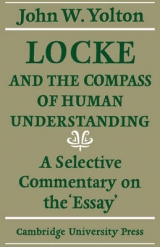
Locke and the Compass of Human Understanding
A Selective Commentary on the 'Essay'
Seiten
1970
Cambridge University Press (Verlag)
978-0-521-07838-2 (ISBN)
Cambridge University Press (Verlag)
978-0-521-07838-2 (ISBN)
- Titel erscheint in neuer Auflage
- Artikel merken
Zu diesem Artikel existiert eine Nachauflage
This book, first published in 1970, discusses John Locke's most important work, Essay Concerning Human Understanding. Professor Yolton delves into the more interesting and controversial doctrines by asking very specific questions of the text in order to test the propriety of the philosophical labels traditionally applied to Locke.
The Essay Concerning Human Understanding is John Locke's most important work, and through this selective commentary, first published in 1970, Professor Yolton concentrates our attention on the more interesting and controversial of the doctrines in it. His method of interpretation is to ask very specific questions of the text in order to test the propriety of the philosophical labels traditionally applied to Locke, an approach which he believes yields surprising results. He looks afresh at the various discussions of essence, perception, scientific method, ethics and meaning, and argues that throughout his epistemology Locke is more concerned with problems of description and analysis than with those of justification. This historical perspective is extended by the discussion of issues in the Essay, which retain an independent and philosophical interest.
The Essay Concerning Human Understanding is John Locke's most important work, and through this selective commentary, first published in 1970, Professor Yolton concentrates our attention on the more interesting and controversial of the doctrines in it. His method of interpretation is to ask very specific questions of the text in order to test the propriety of the philosophical labels traditionally applied to Locke, an approach which he believes yields surprising results. He looks afresh at the various discussions of essence, perception, scientific method, ethics and meaning, and argues that throughout his epistemology Locke is more concerned with problems of description and analysis than with those of justification. This historical perspective is extended by the discussion of issues in the Essay, which retain an independent and philosophical interest.
Preface; Introduction; 1. The nature of things themselves; 2. The science of nature; 3. The method to science; 4. Relations in knowledge and reality; 5. Knowledge of body; 6. Action and agency; 7. Moral concepts and moral principles; 8. Property: an example of mixed-mode analysis; 9. Signs and signification; Bibliography; Index.
| Erscheint lt. Verlag | 2.9.1970 |
|---|---|
| Zusatzinfo | Worked examples or Exercises |
| Verlagsort | Cambridge |
| Sprache | englisch |
| Gewicht | 439 g |
| Themenwelt | Geisteswissenschaften ► Philosophie ► Geschichte der Philosophie |
| Geisteswissenschaften ► Philosophie ► Philosophie der Neuzeit | |
| ISBN-10 | 0-521-07838-5 / 0521078385 |
| ISBN-13 | 978-0-521-07838-2 / 9780521078382 |
| Zustand | Neuware |
| Haben Sie eine Frage zum Produkt? |
Mehr entdecken
aus dem Bereich
aus dem Bereich
die kolonialen Wurzeln der französischen Theorie
Buch | Hardcover (2024)
Matthes & Seitz Berlin (Verlag)
CHF 41,90
oder Das Leben Montaignes in einer Frage und zwanzig Antworten
Buch | Softcover (2023)
C.H.Beck (Verlag)
CHF 25,20



